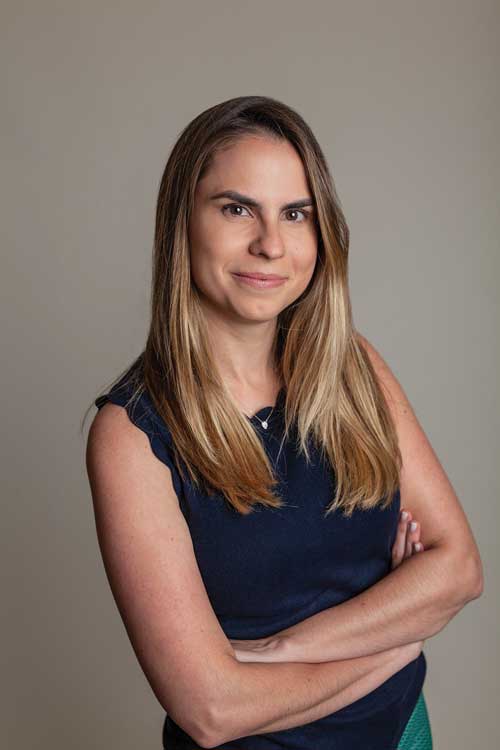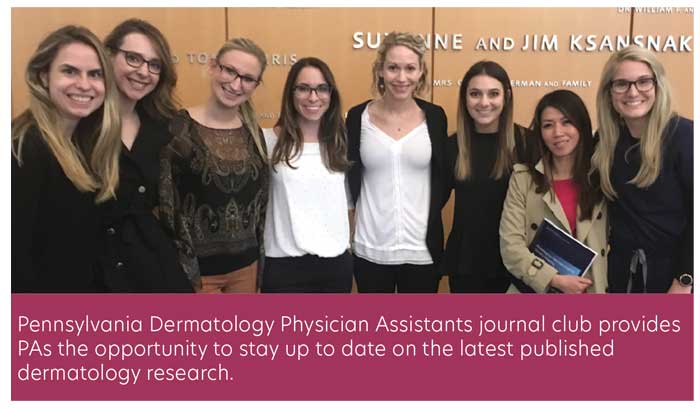 Francesca Wolfe, MPAS, PA-C, earned her Masters degree in Physician Assistant Studies from Thomas Jefferson University in Philadelphia, Pennsylvania. She furthered her training by completing a dermatology fellowship program through the Society of Dermatology Physician Assistants (SDPA). Currently, Ms. Wolfe is a physician assistant with the Pennsylvania Dermatology Group in Philadelphia and teaches general dermatology to physician assistant students at Thomas Jefferson University. Her professional affiliations include the International Dermoscopy Society; the Pennsylvania Dermatology Physician Assistants (PDPA) organization (for which she serves on the Board of Directors as the Director at Large); the Society of Dermatology Physician Assistants (SDPA) (for which she is the continuing medical education (CME) co-chair); and the American Academy of Physician Assistants (AAPA). Ms. Wolfe treats patients of all ages and ethnicities in medical, surgical, and cosmetic dermatology. Her special areas of clinical focus include skin cancer, dermoscopy, and psoriasis.
Francesca Wolfe, MPAS, PA-C, earned her Masters degree in Physician Assistant Studies from Thomas Jefferson University in Philadelphia, Pennsylvania. She furthered her training by completing a dermatology fellowship program through the Society of Dermatology Physician Assistants (SDPA). Currently, Ms. Wolfe is a physician assistant with the Pennsylvania Dermatology Group in Philadelphia and teaches general dermatology to physician assistant students at Thomas Jefferson University. Her professional affiliations include the International Dermoscopy Society; the Pennsylvania Dermatology Physician Assistants (PDPA) organization (for which she serves on the Board of Directors as the Director at Large); the Society of Dermatology Physician Assistants (SDPA) (for which she is the continuing medical education (CME) co-chair); and the American Academy of Physician Assistants (AAPA). Ms. Wolfe treats patients of all ages and ethnicities in medical, surgical, and cosmetic dermatology. Her special areas of clinical focus include skin cancer, dermoscopy, and psoriasis.
When and why did you decide to become a physician assistant?
Francesca: I was still an undergrad and was shadowing my family physician, lamenting the amount of student loans I would accumulate attending medical school. When a male patient with a sensitive issue requested I not be in the examination room, I wandered over to where a group of PAs were sitting who worked there in the clinic. I had no idea what the profession entailed, but within an hour of talking with them, I realized that was my niche.
What led you to pursue a fellowship in dermatology?
Francesca: I was fortunate to work with physicians, early in my career, who were excellent teachers and mentored me through several dermatology textbooks, namely Andrews’ Diseases of the Skin: Clinical Dermatology and Habif’s Clinical Dermatology, which provided me with a good base of knowledge. After a few years, however, I wished to challenge myself as a learner and expand my knowledge of clinical dermatology, which led me to pursue the SDPA’s excellent, and very thorough, dermatology fellowship. It took me two years to finish.
You are active in several professional organizations for physician assistants. Tell us more about these organizations and the volunteer roles you serve with each.
Francesca: I volunteer on the Board of Directors of my state’s PA dermatology society, Pennsylvania Dermatology Physician Assistants. I was involved with creating a journal club that, besides keeping us up to date on the ever-changing derm literature, has created wonderful comradery across the state among dermatology PAs and NPs. It is gratifying to have a place that is easily accessible by experienced clinicians and students alike.
Nationally, I am CME Co-chair for the Society of Dermatology Physician Aassistants (SDPA). We work very hard to produce two national conferences each year that are chock-full of educational talks presented by experts who are selected by our members. We strive to provide all of our attendees—from the newly graduated to those nearing retirement—comprehensive, valuable information they can use in clinical practice.

Tell us more about your volunteering work. What do you find most rewarding about volunteering?
Francesca: The type of volunteer work one does tends to evolve and change with each phase of one’s life. For example, most of my current volunteer time is dedicated to my local and national dermatology associations; however, in the past, I volunteered medical services internationally to those living in refugee camps, as well as domestically in underserved areas, specifically in the Appalachian region.
Volunteering is quite rewarding in the sense that there is so much in the world that is outside of our control, but when we focus on specific areas of need or a special cause, it is possible to make a tremendously positive impact. I remember being quite troubled, a few years back, after reading an article on the failure of local public schools in my city of Philadelphia. I joined a group of like-minded individuals, and together we volunteered to keep an elementary school library functional and to teach reading to underserved kids. I knew I could not fix an entire educational system, but I could help some kids become better readers and provide them with access to educational resources they otherwise would not have had.
Volunteering is beneficial and life-giving to others, and has been shown to increase the quality of life and prevent burnout in healthcare workers.1 I highly recommend the book Give and Take by Dr. Adam Grant, and I encourage NP+PA Perspectives readers to consider volunteering in some capacity to a cause they value. All of us have the power to make someone(s) life better.
As the CME Co-chair for the SDPA, it’s obvious you believe in continuing education for healthcare professionals. How do you think it improves the care PAs and NPs provide their patients?
Francesca: Besides legally keeping our licenses active, quality continuing education exposes us to new guidelines and the latest treatment options. Participating in CME can also challenge the way we look at a particular disease state and, especially in the case of dermoscopy, teach us to see more than we did previously.
The Dermatology Nurses’ Association offers a nationally recognized dermatology certification program to NPs, who earn the DCNP degree upon successful completion. What programs are available to PAs to earn an equivalent certification?
Francesca: There are a couple dermatology fellowship options for PAs upon completion of their board certification. Some university teaching hospitals offer PA fellowships in various specialties, including dermatology. Also, as previously mentioned, the SDPA offers an excellent diplomat fellowship program.
How as COVID impacted your clinical practice?
Francesca: I am very grateful to work at a place that abides by our national guidelines, provides us with access to personal protective equipment (PPE), and takes everyone’s safety as paramount. We have reduced the number of providers we have in the office at one time, as well as how many patients we see a day. Patients with in-person appointments wait in their cars until called, and, after their temperature is taken, are led directly to an exam room to limit any unnecessary person-to-person contact and reduce the spread of pathogens.
Telemedicine has, necessarily, moved to the forefront of healthcare delivery around the country and globally. Tell us about your experience with integrating telemedicine into your clinical practice.
Francesca: I currently see patients via telemedicine one day a week, and, post-pandemic, I will likely continue this practice. Initially, the technological challenges we encountered when using telemedicine, for both me and my patients, were difficult, but the first step to overcoming these challenges was for us all to maintain a sense of humor. Now, not only are we all more technologically savvy, but the technology itself has improved drastically over the past year.
Honestly, what I love most about telemedicine is being able to talk to my patients on a more personal level…and meeting their pets! I often treat entire families, and it’s lovely to see multiple generations of a family together during telemedicine visits. However, there are limitations to the technology as well; for example, because many dermatological conditions require biopsies and other testing that are not available virtually, diagnosis can be challenging.
How do you motivate your patients to remain engaged in their treatment?
Francesca: Listening to patients and understanding their personal goals are a huge part of a successful provider–patient team and achieving sustainable results. I also make a point to return all messages within 24 hours—I think prompt communication and respect of a patient’s time goes a long way.
What do you enjoy most about your job?
Francesca: Dermoscopy and finding early skin cancers are my favorite parts. I am a visual learner, and pattern recognition is incredibly satisfying. My practice consists mainly of full skin examinations in patients with a history of skin cancers. Dermoscopy is an evolving field where you can always improve. I love it!
What emerging treatments in dermatology excite you the most?
Francesca: There are new detection, staging, and treatment options for Merkel cell carcinoma coming out next year that I am looking forward to offering my patients.
What advice would you give students who are studying to become NPs or PAs?
Francesca: Well, first, congrats for choosing a great occupation! Try to expose yourself to different areas of medicine and take the time to pinpoint what you value most in day-to-day responsibilities and lifestyle.
What do you find most rewarding about being a PA in dermatology?
Francesca: The personal relationships are absolutely the best part. I am an extrovert and greatly enjoy talking to patients all day.
Reference
- McGeehan L, Takehara MA, Daroszewski E. Physicians’ perceptions of volunteer service at safety-net clinics. Perm J 2017;21:16-003. doi: 10.7812/TPP/16-003.

